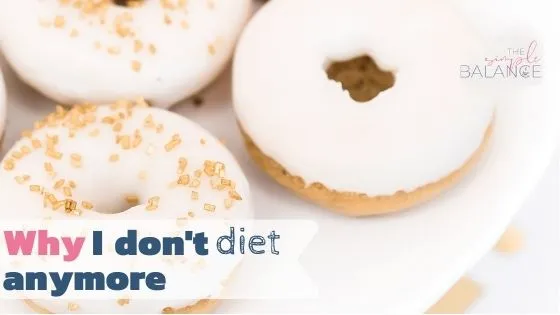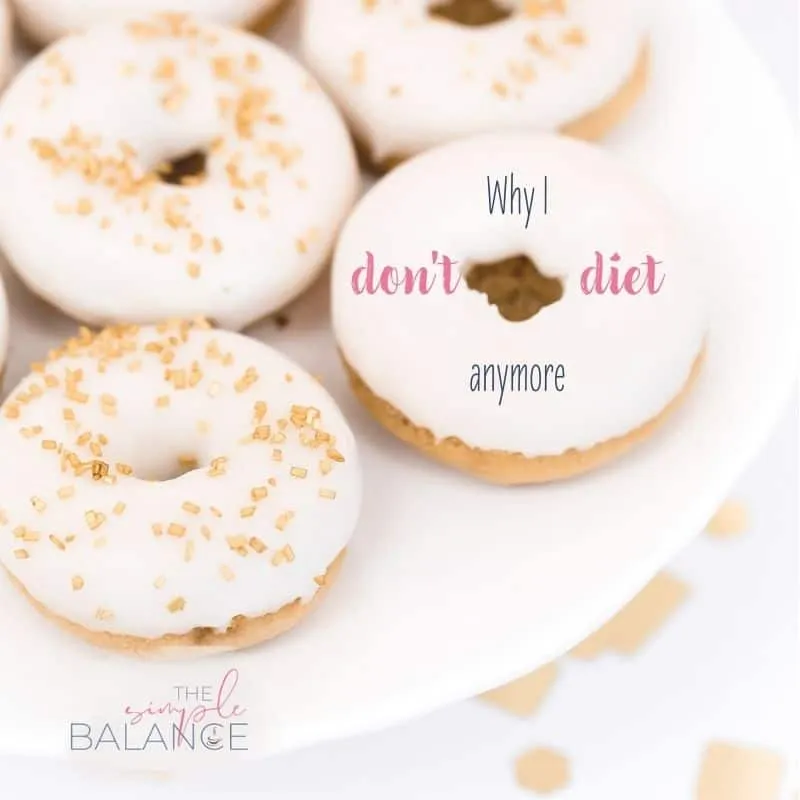Why I don’t diet anymore
Are you on a diet at the moment? If so, you should know the after-effects of food restriction and dieting. This post will also help you find tips on how to lose weight without a diet – and above all how to lead a happier life without dieting.
For most people the beginning of the year is all about one thing: losing weight, exercising more, making up for the lack of moderation during the last month, good intentions, and lots of sacrifices. Even those who are not interested in these kinds of New Year’s resolutions will be confronted with the topic on every corner:
Discount offers on fitness equipment and diet or sugar-free products, and meal replacement shakes at bargain prices. Because everyone knows: obesity is a growing problem in the Western Hemisphere which can and must be dealt with by dieting and a lot of sports.

A simple formula for weight loss
It is very simple: consume fewer calories than you need while at the same time losing more calories through exercise. Mathematically speaking, this way you should have your bikini body in no time. It’s all a question of perseverance and resolve. All you have to do is fight your inner couch potato and successfully convince yourself that cauliflower pizza „dough“ is really tasty …
And since this is so simple in theory, it leads to one logical conclusion: If you are still too fat, you have only yourself to blame for it. You just haven’t tried seriously enough, you’re too weak and have no willpower. As someone who has managed to control her weight with a diet, these were my thoughts as well. But that changed…
My diet career
When at the age of 36 you’ve spent 25 of those years dieting, then one can probably speak of experience in this area. I tried a whole list of different diets:
- the ridiculous Pu-Erh tea capsules
- the 7-grain diet (just as terrible as it sounds)
- replaced meals with shakes
- the cabbage soup diet (only with brave roommates…)
- counting calories
- Weight Watchers
- fasting (which is only a fancy word for not eating)
- and finally low carb
With targeted exercise and a moderate reduction of carbohydrates, I managed to shrink from (US) size 18 to size 8 in 2008. And even after three pregnancies, I stayed at size 10.
Now, you could raise two objections to why I am writing this post at all:
- If I’ve stayed away from my old excess weight, it’s logical that I don’t diet anymore, right?
- If I was successful with a concept, why don’t I recommend it now to all those who don’t even dare to dream of size 10? Why am I writing an article instead that will turn out to be railing against the diet mentality?
The problem with trying to keep your weight
Well, I can meet the first objection with the fact that a few persistent pounds were left behind from the third pregnancy. Not enough to have to buy trousers a bigger size, but enough to not feel comfortable in the old ones.
Now one obvious conclusion here would be going back to my old program and sacrifice food and within a few months, the few pounds would no longer be an issue.
But – and this brings me to the answer to the second objection – after many years of struggling with dieting, this is what I learned:
Diets (no matter how weird or moderate) do not address the basic problem. They actually turn into the main problem. In addition, today I know that I belong to a very lucky, but also very small minority: 95-98% of all dieting people are not able to maintain their weight.
Numerous studies even prove that it is only a question of time until the lost weight is gained again – and usually it’s even more than before. Some even go so far as to say that dieting and food restriction is the best way to add more weight.
So let’s see why this is the case.

Fight against biology
Apparently, I’m not the only one who stops sticking to diet restrictions and food bans at some point.
Our brain is wired to do everything possible to protect us from starvation and therefore finds ways around restrictions. It’s not interested in things like outward appearance or body image. Its priority is survival.
By the way, recent findings show that the area in the brain that is responsible for willpower and self-control also seems to be highly linked to the body’s blood sugar level. It’s downright silly that one needs the most willpower during a diet when the blood sugar level is often very low.
The battle against extra pounds, therefore, has an unexpectedly strong opponent: your own body.
The hunger study by Ancel Keys
I found a study from the 1940s to be eye-opening. It examined the effects of long periods of hunger and food restriction on soldiers.
A group of strong young men was only allowed to consume about 1600 kcal per day for several months. People on a diet might frown at this point and ask “That many calories?!?”.
The effects of this experiment on the physically and mentally fit men were incredible:
Eating became their lives’ new focus. Ravenous appetite attacks, eating attacks, poor self-image, depression, an inability to self-restrain, and long-term obesity were just some of the consequences.
According to current standards, the study is regarded as an unethical hunger study that must not be repeated in this way. And that’s on 400 calories more than some weight-reduction diets in hospitals.
The fight against psychology
The psychological aspect of diets became surprisingly clear through the study. What is the automatic response to the request NOT to think of a blue elephant? What happens when you can eat anything but apples?
Even if you don’t particularly care about apples, a ban will suddenly increase your interest. Restricting certain foods makes them especially interesting for the brain. And that is why it takes a lot of willpower not to eat the forbidden, unhealthy foods.
For a while, it is possible to do without. You feel good, lose a bit of weight, have the feeling of control and you can clearly see the goal in front of your eyes. And that is seen as proof that dieting works.
However, after a few weeks of exhaustion or stress, this high feeling is dampened. And the result is usually that you eat everything that was forbidden for so long. Or you can’t stop after the one allowed cookie and you eat four more. What follows now is something that I thought for years was a very personal sign of my inadequacy, but interestingly enough it occurs across cultures: The “Now nothing matters anymore” reaction, which is a direct consequence of diets.
“Now nothing matters anymore”
Instead of just accepting the additional 300 kcal of four illegal biscuits and stopping right there, a switch now flips: the person who is actually willing to lose weight eats whatever “illegal” food is within reach. But they do this with a bad conscience and the feeling of failure. And, of course, with the firm intention of making things right again tomorrow/next week/after New Year’s Eve with even stricter rules.
Through this “Now nothing matters anymore” response, thousands of extra calories are easily absorbed – multiple times more than the initial four biscuits that triggered the whole episode. And so the cycle starts all over again.
This completely normal reaction alone makes it clear why dieting and food restrictions usually means long-term weight gain.
The real problem
The much deeper problem is usually not what we eat. On closer inspection, you will notice that most of the unnecessary calories come from somewhere else: We eat for reasons other than hunger.
I often found it difficult when a dieting program promised that you would definitely not be hungry. That might be true, but what should I do with my appetite? My appetite seemed to me to be a much bigger problem and, of course, it was particularly focused on “banned” foods.
I now know that most of these cases fall into the category of emotional eating. And that has about as much to do with physical hunger as cauliflower pizza „dough“ with real dough. A diet doesn’t help me to distinguish whether real hunger or a certain feeling cause my desire for walnuts/carrot sticks/chocolate.
A solution
Now you could ask: What is the way out of obesity if it is not dieting and food restriction? Based on everything I have learned so far, I believe that a combination of rather unpopular methods reduces weight in the long run – and above all, leads to a relaxed, healthy and emotionally regulated way of dealing with food:
- Re-learning the originally innate intuitive eating (is there any species apart from humans that also eats according to guidelines and nutrition tables?)
- Dealing with emotional triggers for the desire to eat (could I perhaps distract myself from frustration with other means besides a bar of chocolate?)
- Eating and enjoying consciously (how often do I eat more than I need because I’m too distracted to notice the point of fullness and satisfaction?)
- Routine physical activity and wellness sports (hours of jogging or sweating cannot compensate for the effect of too little daily exercise and movement…)
So does it really matter what I eat?
Yes and no. In the healthy eating category on this site, you will find a few posts that deal with this question (and I’m adding more over time). When this post was first published, I was still at the very beginning of my learning process. How the process of learning more about intuitive eating affected my quality of life and weight in the following years can be found here:
Intuitive eating – an honest one-year review
If you can see yourself in this post and want to break out of the eternal spiral of diets, then you may take hope.
It is not your own failure if a diet does not work. Diets are the wrong tool.
Josie Spinardi
Look around in my posts on this subject and take yourself on a journey towards freedom. It took me four years to learn, but being able to be relaxed and eat without pressure and stress was worth all the effort.
Last update on 2026-02-24 at 10:29 / As an Amazon Associate we earn from qualifying purchases. / Images from Amazon Product Advertising API




Leave a Reply